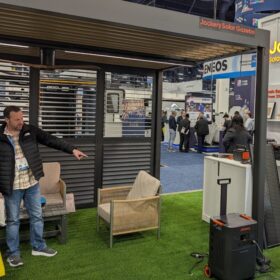For at least the sixth time in anti-dumping and anti-subsidy trade cases over the past 13 years, the U.S. domestic solar industry became divided during a hearing on Tuesday to explore whether solar modules and cells imported from China have materially harmed the domestic manufacturing industry.
In this instance, the U.S. International Trade Commission (ITC) already has preliminarily affirmed that U.S. solar imports from Cambodia, Malaysia, Thailand and Vietnam have materially hurt U.S. domestic production. These cases have contended that China has massively built out production in those four countries to sidestep U.S. duties in cases going back to 2012 on Chinese solar imports produced in other countries.
In an all-day hearing on Tuesday, the ITC collected testimony it will use to makes a final determination, which is expected in May. If the commission were to rule affirmatively again on industry harm, the commission would activate a range of import duties on solar imports from the four countries.
Final anti-dumping and anti-subsidy duty determinations from the U.S. Department of Commerce are expected to be made public on Monday, affirming or adjusting duties that the department already has imposed on a preliminary basis on solar imports from the four countries.
On Tuesday, petitioners testified that massive Chinese overproduction, particularly producing U.S. imports from the Southeast Asian countries, has swamped the U.S. market with product priced at or below U.S. production costs. The result, witnesses said, has left too much U.S. manufacturing capacity idle, too many factory expansion plans unfulfilled and too many potential production workers unemployed.
Respondents, industry players who countered the petitioners’ claims, said that solar incentives brought to life by the Inflation Reduction Act of 2022 have helped lower prices for solar production and deployment, closing the gap between production costs and prices.
They also argued that the scope of the cases covering both solar modules and cells is extremely counterproductive because resulting duties would limit domestic factory access to imported cells, which the fast-growing module-manufacturing industry desperately needs to grow. Domestic cell production is still small and though growing, they said it would be several years before the business could fulfill cell demand for domestic module production.
The issue came down to whether modules and cells are considered “like products,” a legal term that, in this case, refers to directly competitive or substitutable products that are identical to the product produced by a different country. If modules and cells are determined to be “like products,” then the ITC will launch an investigation to determine whether the U.S. is experiencing economic harm due to the imported cells and modules.
Witnesses for the petitioners included members of the American Alliance for Solar Manufacturing Trade Committee, which brought the cases, including Hanwha QCells USA, Mission Solar, Suniva Inc. and Talon PV.
Witnesses for the respondents included the American Clean Power Association, BYD America, Canadian Solar, Climate Energy Associates, Runergy Alabama Inc., Solar Energy Industries Association, Trade Pacific and Trina Solar.
This content is protected by copyright and may not be reused. If you want to cooperate with us and would like to reuse some of our content, please contact: editors@pv-magazine.com.









By submitting this form you agree to pv magazine using your data for the purposes of publishing your comment.
Your personal data will only be disclosed or otherwise transmitted to third parties for the purposes of spam filtering or if this is necessary for technical maintenance of the website. Any other transfer to third parties will not take place unless this is justified on the basis of applicable data protection regulations or if pv magazine is legally obliged to do so.
You may revoke this consent at any time with effect for the future, in which case your personal data will be deleted immediately. Otherwise, your data will be deleted if pv magazine has processed your request or the purpose of data storage is fulfilled.
Further information on data privacy can be found in our Data Protection Policy.